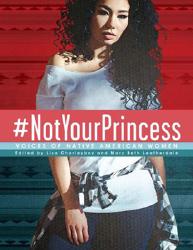Review
#NotYourPrincess: Voices of Native American Women
- Lisa Charleyboy and Mary Beth Leatherdale, eds.
- Annick Press, 2017

#NotYourPrincess makes a strong, specific claim: that Indigenous women must assert their right to represent themselves on their own terms. This means rejecting imagery like “sexy Pocahontas” and narratives of helpless victimhood, without ignoring the complex reality of Indigenous girls’ and women’s lives. Canadian statistics, for instance, show that Indigenous women are some of the most economically and socially vulnerable people in Canada. The texts in #NotYourPrincess acknowledge that reality and speak back with empowerment, strength, and hope.
This colourful, spacious volume brings together illustrated art and photography, comic-style storytelling, personal commentary about current events such as the Missing and Murdered Indigenous Women inquiry and the Dakota Access Pipeline, and a range of creative writing. Girls and women talk about dealing with and overcoming difficult childhoods, institutional discrimination, and casual racism. They identify and thank women who have led the fight for greater recognition and inclusion. Some imagery is drawn from social media and historical or contemporary photography. Readers encounter representations of strong, accomplished Indigenous women, but also eye-opening discussions of what it means to present oneself physically as an Indigenous woman. The presentation, while openly political, is finely balanced: readers are invited to find their own space in the discourse.
#NotYourPrincess is an important and valuable book. Transcending the colonially imposed border between the United States and Canada, the collection includes perspectives from north and south, west and east; contributors are identified by their Indigenous affiliation. Although the book is explicitly “a love letter to all young Indigenous women trying to find their way,” it is also important for non-Indigenous readers to understand how destructive stereotypical representation and cultural silencing can be and have been. This book needs to be widely read and discussed because the changing representation of Indigenous girls and women is a central and urgent element of reconciliation and healing. #NotYourPrincess can help readers find the resilience and courage to make positive changes. Librarians, teachers, parents: please put this book into girls’ and teens’ hands.
This review was originally published in Resource Links December 2017
